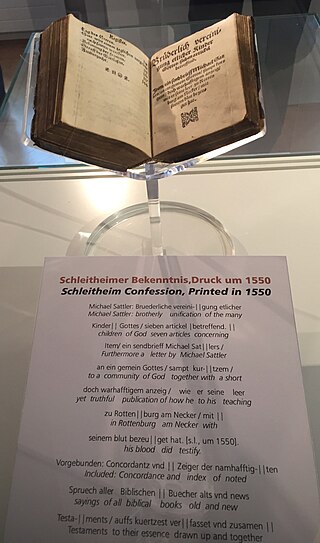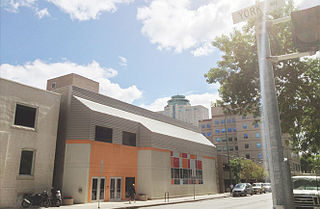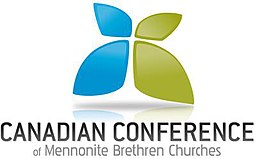
Mennonites are a group of Anabaptist Christian communities tracing their roots to the epoch of the Radical Reformation. The name Mennonites is derived from the cleric Menno Simons (1496–1561) of Friesland, part of the Holy Roman Empire, present day Netherlands. Menno Simons became a prominent leader within the wider Anabaptist movement and was a contemporary of Martin Luther (1483–1546) and Philip Melanchthon (1497–1560). Through his writings about the Reformation Simons articulated and formalized the teachings of earlier Swiss Anabaptist founders as well as early teachings of the Mennonites founded on the belief in both the mission and ministry of Jesus. Formal Mennonite beliefs were codified in the Dordrecht Confession of Faith (1632), which affirmed "the baptism of believers only, the washing of the feet as a symbol of servanthood, church discipline, the shunning of the excommunicated, the non-swearing of oaths, marriage within the same church", nonresistance, and in general, more emphasis on "true Christianity" involving "being Christian and obeying Christ" as they interpret it from the Holy Bible.
The Christian Mennonite Conference, formerly known as the Chortitzer Mennonite Conference, is a small body of Mennonites in western Canada.
The Evangelical Mennonite Conference is a conference of Canadian evangelical Mennonite Christians headquartered in Steinbach, Manitoba, with 62 churches from British Columbia to southern Ontario. It includes people with a wide range of cultural and denominational backgrounds.

Mennonite Church Canada, informally known as the General Conference, is a Mennonite denomination in Canada, with head offices in Winnipeg, Manitoba. It is a member of the Mennonite World Conference and the Evangelical Fellowship of Canada.
The US Conference of Mennonite Brethren Churches (USMB) is an association of Mennonite Brethren Churches in the United States.
The Mennonite Brethren Church is an evangelical Mennonite Anabaptist movement with congregations.

Anabaptist theology, also known as Anabaptist doctrine, is a theological tradition reflecting the doctrine of the Anabaptist Churches. The major branches of Anabaptist Christianity agree on core doctrines but have nuances in practice. While the adherence to doctrine is important in Anabaptist Christianity, living righteously is stressed to a greater degree.
Old Order Mennonites form a branch of the Mennonite tradition. Old Order are those Mennonite groups of Swiss German and south German heritage who practice a lifestyle without some elements of modern technology, still drive a horse and buggy rather than cars, wear very conservative and modest dress, and have retained the old forms of worship, baptism and communion.

The Russian Mennonites are a group of Mennonites who are the descendants of Dutch and North German Anabaptists who settled in the Vistula delta in West Prussia for about 250 years and established colonies in the Russian Empire beginning in 1789. Since the late 19th century, many of them have emigrated to countries which are located throughout the Western Hemisphere. The rest of them were forcibly relocated, so very few of their descendants currently live in the locations of the original colonies. Russian Mennonites are traditionally multilingual but Plautdietsch is their first language as well as their lingua franca. In 2014, there were several hundred thousand Russian Mennonites: about 200,000 live in Germany, 74,122 live in Mexico, 150,000 in Bolivia, 40,000 live in Paraguay, 10,000 live in Belize, tens of thousands of them live in Canada and the US, and a few thousand live in Argentina, Uruguay, and Brazil.

The General Conference Mennonite Church (GCMC) was a mainline association of Mennonite congregations based in North America from 1860 to 2002. The conference was formed in 1860 when congregations in Iowa invited North American Mennonites to join together in order to pursue common goals such as higher education and mission work. The conference was especially attractive to recent Mennonite and Amish immigrants to North America and expanded considerably when thousands of Russian Mennonites arrived in North America starting in the 1870s. Conference offices were located in Winnipeg, Manitoba and North Newton, Kansas. The conference supported a seminary and several colleges. In the 1990s the conference had 64,431 members in 410 congregations in Canada, the United States and South America. After decades of cooperation with the Mennonite Church, the two groups reorganized into Mennonite Church Canada in 2000 and Mennonite Church USA in 2002.
Eigenheim Mennonite Church is a Mennonite church in the Canadian province of Saskatchewan which built the first Mennonite Church building in the province.

Columbia Bible College (CBC) is an evangelical Mennonite Bible College in Abbotsford, British Columbia, Canada. It is affiliated with two regional Mennonite conferences, British Columbia Mennonite Brethren and Mennonite Church British Columbia. Columbia is accredited by the international Association for Biblical Higher Education (ABHE), and is registered with the British Columbia Private Career Training Institution Association (PCTIA).

The Meeting Place (TMP) is an evangelical Mennonite church located in downtown Winnipeg, Manitoba. It is a member of the Canadian Conference of Mennonite Brethren Churches and the Mennonite Brethren Church of Manitoba. The Meeting Place's mission statement is "to be a biblically-functioning community leading people to become fully devoted followers of Jesus Christ."
Benjamin B. Janz was a minister of the Mennonite Brethren Church who was instrumental in assisting thousands of Mennonites in emigrating from the Soviet Union to Canada.

The Global Anabaptist Mennonite Encyclopedia Online (GAMEO) is an online encyclopedia of topics relating to Mennonites and Anabaptism. The mission of the project is to provide free, reliable, English-language information on Anabaptist-related topics.
Kleine Gemeinde is a Mennonite denomination founded in 1812 by Klaas Reimer in the Russian Empire. The current group primarily consists of Plautdietsch-speaking Russian Mennonites in Belize, Mexico and Bolivia, as well as a small presence in Canada and the United States. In 2015 it had some 5,400 baptized members. Most of its Canadian congregations diverged from the others over the latter half of the 20th century and are now called the Evangelical Mennonite Conference.
Conservative Mennonites include numerous Conservative Anabaptist groups that identify with the theologically conservative element among Mennonite Anabaptist Christian fellowships, but who are not Old Order groups or mainline denominations.
The Orthodox Mennonites, also called Wellesley Orthodox Mennonites and Huron Orthodox Mennonites, are two groups of traditional Old Order Mennonites in Canada and the US with about 650 baptized members. Even though plain to a very high degree and primitivist concerning technology, they are rather intentionalist minded than ultra traditional. Since 1999 they were joined by several other Old Order Mennonite communities.

Old Order Anabaptism encompasses those groups which have preserved the old ways of Anabaptist Christian religion and lifestyle.










